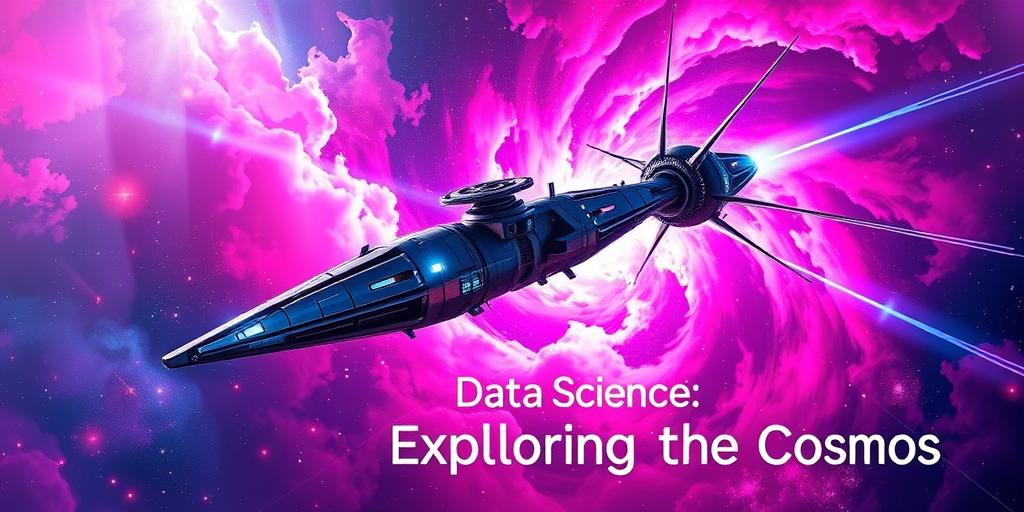Prepare for liftoff into the exhilarating realm of space exploration! Data science isn’t just for Earth-bound problems anymore; it’s become the ultimate tool for unlocking the cosmos’s mysteries. From navigating uncharted territories to discovering new worlds, data science is revolutionizing the future of space exploration in ways you won’t believe. Get ready to explore the exciting intersection of these two seemingly disparate fields and discover how they’re propelling us into a new era of space travel and discovery.
Data Science: The Unsung Hero of Space Exploration
Data science is no longer a futuristic fantasy; it’s a present-day reality that’s dramatically changing how we approach space exploration. Forget the old ways of relying solely on intuition and guesswork—modern space missions are fueled by massive amounts of data. This data comes from a variety of sources, including satellites, telescopes, rovers, and probes. Analyzing this data allows for more efficient planning of missions, identification of potential hazards, and a greater chance of success. Think of it as having a cosmic crystal ball, powered by algorithms and statistical models, providing invaluable insights into the vast universe.
Analyzing Astronomical Data
The sheer volume of data produced by astronomical observations is staggering. Telescopes like the Hubble Space Telescope and the James Webb Space Telescope generate terabytes of data every day, all filled with the potential for groundbreaking discoveries. Data science techniques such as machine learning are vital for sifting through this massive dataset, identifying patterns and anomalies that might otherwise be missed. These patterns can reveal the presence of exoplanets, dark matter, or even provide clues about the formation of galaxies.
Optimizing Mission Planning and Resource Allocation
Before a single rocket leaves the ground, countless hours are spent on meticulous planning and resource allocation. Data science plays a key role here, leveraging predictive modeling to simulate mission scenarios, assess risks, and optimize fuel consumption. This precise planning translates to cost savings, reduced mission risks, and ultimately, a more successful exploration.
Enhancing Spacecraft Navigation and Autonomous Systems
The vast distances involved in space travel make real-time human intervention impractical. Autonomous systems and AI-powered navigation are becoming increasingly important, and the algorithms that drive these systems are powered by sophisticated data science models. These models analyze real-time data from sensors and satellites to provide precise navigation and obstacle avoidance. This is critical for ensuring the safety and longevity of space missions.
Future Trends in Space Data Science
The future of space exploration and data science is intertwined, with each field propelling the other forward. We’re on the cusp of a new era, where even more innovative applications of data science will transform space travel.
Deep Learning and Artificial Intelligence
Deep learning and AI are set to revolutionize data analysis in space exploration. These cutting-edge technologies can identify subtle patterns and anomalies that human analysts might miss, accelerating the pace of discovery. From identifying potential landing sites to predicting solar flares, AI will play a crucial role in future missions.
Big Data and Cloud Computing
The massive amount of data generated by space missions necessitates the use of big data and cloud computing solutions. This infrastructure can efficiently store, process, and analyze data from various sources, providing insights that would be impossible to obtain otherwise. Cloud-based data processing enables scientists worldwide to collaborate on space research, accelerating the rate of progress.
Space-Based Data Science
Imagine data science happening directly in space! Future space missions might include dedicated data science labs aboard spacecraft, enabling real-time data analysis and decision-making. This onboard processing will significantly reduce the reliance on ground-based infrastructure, accelerating exploration and increasing autonomy.
Challenges and Opportunities in Space Data Science
While the potential of space data science is immense, several challenges need to be addressed to fully harness its power. Data security, data transmission in the challenging space environment, and the development of robust algorithms are crucial areas needing attention. Despite these challenges, the opportunities are vast and ripe for exploitation. This is a field with massive potential for groundbreaking discoveries and technological advancements.
Overcoming the Challenges
Tackling the challenges requires a multidisciplinary approach, uniting the expertise of data scientists, engineers, and space scientists. By working together, these challenges can be converted into opportunities for growth and advancement. Investing in advanced technologies such as quantum computing and specialized hardware could provide solutions to data processing and transmission limitations.
Embracing the Future
The future of data science in space exploration is bright. It’s a field full of untold possibilities, promising incredible scientific breakthroughs. From uncovering the secrets of distant galaxies to discovering life beyond Earth, data science will be the driving force behind the most significant discoveries of the next century. The possibilities are as limitless as the universe itself.
Ready to blast off into the future of space exploration and data science? Click here to learn more!




